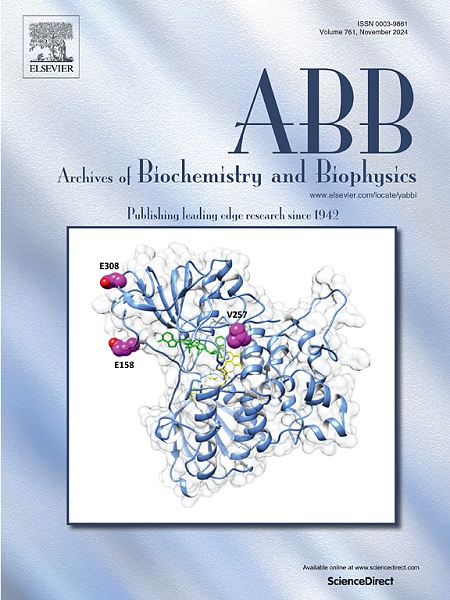氧化磷脂酰胆碱对RAW264.7巨噬细胞脂质组的影响
IF 3.8
3区 生物学
Q2 BIOCHEMISTRY & MOLECULAR BIOLOGY
引用次数: 0
摘要
氧化磷脂(OxPLs)已成为损伤相关的关键分子模式(DAMPs)和许多生物过程的调节剂,包括炎症,在健康和疾病中发挥着重要作用。尽管它们对巨噬细胞极化有公认的影响,但不同的OxPL物种影响巨噬细胞行为的确切机制仍然知之甚少。本研究通过LC-MS脂质组学分析,研究了两种氧化磷脂酰胆碱(OxPC): omega 3- 1-硬脂酰-2-二十二碳六烯醇- n-甘油-3-磷脂酰胆碱(OxPC22:6)和omega 6 - 1-硬脂酰-2-亚油酰- n-甘油-3-磷脂酰胆碱(OxPC18:2)对RAW264.7巨噬细胞脂质组学的影响。我们的研究结果表明,所研究的oxpc对巨噬细胞脂质组的调节不同,突出了sn-2酰基链组成对其生物学功能的重要性。单独给药时,两种OxPCs均未在巨噬细胞中诱导促炎表型。OxPC22:6似乎在巨噬细胞中诱导了一个预备的促炎状态,改善了它们随后的炎症反应,而OxPC18:2似乎在巨噬细胞中诱导了一个静息状态。在LPS刺激下,发现两种oxpc选择性地减弱某些LPS驱动的脂质组学变化(PC)。啊,电脑。P,π。P, PE.P),同时扩增其他(DG, Cer, LPC, PE.P)。O,π。O, TG, PC, PI),并引入巨噬细胞脂质组的独特改变(SM, PE, LPE)。核心脂质组学变化对巨噬细胞的LPS反应至关重要,TG、DG、Cer、PC、LPC和PI持续升高。O和PE的降低。0, PI和CAR。这些观察结果表明,在LPS存在下,主要是OxPC22:6放大了巨噬细胞的促炎脂质组学特征。需要进一步的研究来阐明所观察到的脂质组适应是改善、损害还是抑制巨噬细胞的炎症能力和反应。本文章由计算机程序翻译,如有差异,请以英文原文为准。

Impact of oxidized phosphatidylcholine supplementation on the lipidome of RAW264.7 macrophages
Oxidized phospholipids (OxPLs) have emerged as critical damage-associated molecular patterns (DAMPs) and modulators of numerous biological processes, including inflammation, playing a significant role in health and disease. Despite their recognized influence on macrophage polarization, the precise mechanisms by which distinct OxPL species shape macrophage behavior remains poorly understood. The present study investigates the impact of two oxidized phosphatidylcholines (OxPC): omega 3 1-stearoyl-2-docosahexaenoyl-sn-glycero-3-phosphatidylcholine (OxPC22:6), and omega 6 1-stearoyl-2-linoleoyl-sn-glycero-3-phosphatidylcholine (OxPC18:2), on the lipidomic profile of RAW264.7 macrophages, through an LC-MS lipidomic analysis. Our findings demonstrate that the OxPCs under study modulate macrophage lipidome differently, highlighting the significance of the sn-2 acyl chain composition for their biological function. When administered alone, neither of the OxPCs induced a pro-inflammatory phenotype in macrophages. OxPC22:6 appears to induce a preparatory pro-inflammatory state in macrophages, improving their subsequent inflammatory responses, while OxPC18:2 seems to induce a resting state on macrophages. Under LPS stimulation, both OxPCs were found to selectively attenuate certain LPS-driven lipidomic changes (PC.O, PC.P, PI.P, PE.P) while amplifying others (DG, Cer, LPC, PE.O, PI.O, TG, PC, PI) and introducing unique alterations to the macrophage lipidome (SM, PE, LPE). Core lipidomic changes, crucial for macrophages' LPS response, were identified, with sustained elevation of TG, DG, Cer, PC, LPC, and PI.O and reduction of PE.O, PI, and CAR. These observations suggest that, in the presence of LPS, mainly OxPC22:6 amplifies the pro-inflammatory lipidomic signature of macrophages. Further research is needed to clarify whether the observed lipidomic adaptations improve, impair, or inhibit macrophages' inflammatory capacities and response.
求助全文
通过发布文献求助,成功后即可免费获取论文全文。
去求助
来源期刊

Archives of biochemistry and biophysics
生物-生化与分子生物学
CiteScore
7.40
自引率
0.00%
发文量
245
审稿时长
26 days
期刊介绍:
Archives of Biochemistry and Biophysics publishes quality original articles and reviews in the developing areas of biochemistry and biophysics.
Research Areas Include:
• Enzyme and protein structure, function, regulation. Folding, turnover, and post-translational processing
• Biological oxidations, free radical reactions, redox signaling, oxygenases, P450 reactions
• Signal transduction, receptors, membrane transport, intracellular signals. Cellular and integrated metabolism.
 求助内容:
求助内容: 应助结果提醒方式:
应助结果提醒方式:


